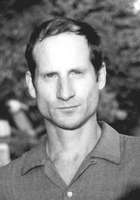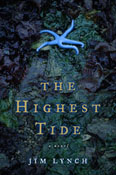- Categories:
Poignant Coming-of-Age Tale Illuminates the Wonders of the Sea
 Author Jim Lynch |
When Bookselling This Week spoke with debut novelist Jim Lynch, he'd just returned from a sailing adventure, a vacation activity befitting the author of September Book Sense Pick The Highest Tide (Bloomsbury USA).
"Where Washington state's Puget Sound stretches into Canada, there's a wonderland of islands I could spend years exploring -- the San Juan Islands. I go there with my family and we poke around," Lynch said of his sea voyage.
And in his 13th summer, Miles O'Malley, protagonist of The Highest Tide, does a bit of exploring as well -- the enterprising teenager roams the tidal flats near his home in search of small sea creatures he can sell to local aquariums and restaurants. He's more than a bit astonished, then, when moonlight reveals that an enormous and rare sea creature has washed ashore.
 It's the first of several flabbergasting sea-creature sightings for Miles, rendering an already confusing summer (his parents are on the outs, his beloved neighbor is ill, and he has a crush to end all crushes on his former babysitter) even more so. Before long, the local media dubs Miles a prophet, and his diminutive stature earns him unwanted media-darling status.
It's the first of several flabbergasting sea-creature sightings for Miles, rendering an already confusing summer (his parents are on the outs, his beloved neighbor is ill, and he has a crush to end all crushes on his former babysitter) even more so. Before long, the local media dubs Miles a prophet, and his diminutive stature earns him unwanted media-darling status.
Lynch noted that his 19 years of experience as a journalist gave him plenty of material to spoof the superficiality of the reporters in the book -- and for drawing a realistic portrait of someone affected by media attention, as well. "When I was a reporter, I'd roam around and find big stories. I was used to seeing people deal with the media for the first time.... They immediately became slightly different," he said.
Although his career as a reporter in many ways led Lynch to authordom -- his research and interviewing skills were put to excellent, exhaustive use in crafting The Highest Tide -- he quit his job as a journalist in July 2004, just days after signing the contract to write the novel.
Lynch explained, "One of the reasons I quit my job was that the book sold when it was only two-thirds completed, and I had what seemed like a tight deadline. I sold it in July, and needed to finish it by November. Not knowing how to write fiction on deadline, I felt I should devote myself to it entirely."
Incredibly detailed descriptions of the tidal flats and its flora and fauna pay testament to Lynch's devotion to getting every detail right. "Sea life was never my thing," he explained. "This was new territory for me." However, despite Lynch's having "no scientific background," he said, "what I do have is the journalist's craft of knowing how to do research, and how to find good experts and squeeze out all their information."
He read more than a dozen books on marine biology and had biologists check his text: "All the marine biology facts and details are as accurate as you can get, I was told. It's plausible that each of the events could have happened -- but whether they could have happened all in one summer is another matter."
Lynch knows firsthand the possibility of encountering a rare being: "What inspired the book right out of the gate was a bizarre, large deep-sea creature that washed up on a beach near my house. I poked around and learned that quite often kids make discoveries, because they're the ones with the time and interest to go out there and see things."
A local man who for 27 years has given tours of the tidal flats near Lynch's home (and Miles' fictional one, too) served as an excellent resource, both in terms of sea life and the children who become fascinated by it. Said Lynch, "[The tour guide] ran into kids that became obsessed, who after five or six years all of a sudden had a body of knowledge that surprised adults." He added, "The age of 12 or 13 is the great golden age, when kids have an adult-sized brain and everything is clear, but they don't have a cluttered adult mind yet. They don't have to-do lists that get in the way."
Of course, some distractions do conspire to complicate Miles' life, particularly his feelings for Angie (his erstwhile babysitter), and a growing curiosity about sex. Miles is charming in his tentative pursuit of his beloved, and in his quest for knowledge about the mysteries of mating. While his friend Phelps relies on The Godfather and racy magazines for the truth about sex, Miles checks a book out of the library (he mixes it among texts about sea creatures).
The exchanges between the two boys make for some of the funniest scenes in the book -- and, overall, Lynch has done a top-notch job of tempering science with romance, drama with humor. He noted, "I wouldn't say the writing process was easy, but it was fun to research and write."
For example, Lynch pointed out, just as Miles makes life-altering discoveries during a tumultuous summer, so too did Lynch discover things that changed his own outlook: "I figured we were at a point where we essentially know all there is to know [about marine biology], but we are still constantly discovering new fish that haven't been named before. It stuck with me, the excitement of science -- there's so much to know, especially in the ocean, which we haven't fully explored."
Exploring the works of writer Rachel Carson was also pivotal to Lynch's experience writing the The Highest Tide. He said, "I was enamored with her on the grounds of Silent Spring. I viewed her as a righteous, muckraking heroic figure. I didn't know she had done oceanography books, but I found them and just got hooked on them."
The spirit of Carson infuses and informs the book: Her respect for the ocean and acknowledgment of nature's majesty and mystery is brought forth via Miles' enthusiastic recounting of her findings and writings. Lynch said, "It was a critical point in building the book ... it felt plausible to pass my growing obsession with [Carson] along to the protagonist. It worked as a nice chorus throughout the book, and I thought it gave the book some integrity, some sweetness, that a boy could be so appreciative of a woman scientist from the 1950s."
Although The Highest Tide clearly demonstrates the beauty that can be found in biology -- and makes a compelling case for greater appreciation of the natural world -- Lynch said, "I wasn't out to push an environmental agenda. But if there was one ... there's so much to be had by experiencing nature that goes beyond realizing the importance of protecting it." And, he added, "It's fun to play with the premise that an observant boy can be seen as a genius or prophet just because he is paying attention or looking at nature closely." --Linda M. Castellitto

